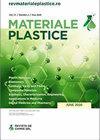基于人工神经网络模型的玻璃纤维聚合物复合材料抗拉强度预测
IF 0.6
4区 材料科学
Q4 MATERIALS SCIENCE, MULTIDISCIPLINARY
引用次数: 1
摘要
突出聚合物复合材料的性能是一个复杂的过程,因为它们具有巨大的多样性和广泛的特性变化范围。利用LabVIEW软件设计了一个用于预测抗拉强度的人工神经网络模型。所提出的模型是为含有30%、40%和50%玻璃纤维的随机增强聚合物复合材料开发的。玻璃纤维的体积分数是本研究的自变量。通过使用神经网络建模,研究并强调了拉伸强度对体积分数的依赖性。所设计的人工神经网络表现为一个计算系统,使用由层组成的函数网络将数据输入处理成所需的输出。训练过程是用具有两个隐藏层的不同人工神经网络架构开发的,以产生最佳的预测结果。对于每个隐藏层,神经元的数量在3到50之间变化。本文章由计算机程序翻译,如有差异,请以英文原文为准。
Tensile Strength Prediction of Fiberglass Polymer Composites Using Artificial Neural Network Model
Highlighting the properties of polymer composites is a complex process given their great diversity and the wide range in which their characteristics could vary. An Artificial Neural Network model for predicting tensile strength was designed using LabVIEW software. The proposed model was developed for randomly reinforced polymeric composite materials with 30%, 40% and 50% fiber-glass. Volume fraction of glass fibre has represented the independent variable for this study. The dependence of the tensile strength on the volume fraction was investigated and highlighted by modelling using neural networks. The designed Artificial Neural Network behaves as a computational system that process data input into a desired output using a network of functions composed of layers. The training process was developed with different Artificial Neural Network architectures with two hidden layers to produce the best prediction results. For each hidden layer the number of neurons was varied be-tween 3 to 50.
求助全文
通过发布文献求助,成功后即可免费获取论文全文。
去求助
来源期刊

Materiale Plastice
MATERIALS SCIENCE, MULTIDISCIPLINARY-
CiteScore
1.40
自引率
25.00%
发文量
99
审稿时长
6-12 weeks
期刊介绍:
Materiale Plastice, abbreviated as Mater. Plast., publishes original scientific papers or guest reviews on topics of great interest.
The Journal does not publish memos, technical reports or non-original papers (that are a compiling of literature data) or papers that have been already published in other national or foreign Journal.
 求助内容:
求助内容: 应助结果提醒方式:
应助结果提醒方式:


